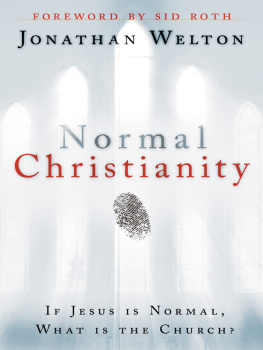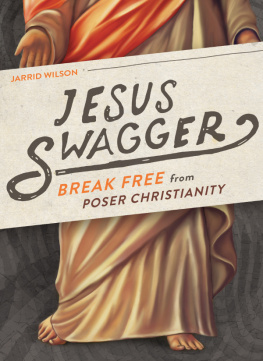
W hile many authors write whole books on each of the following topics, I chose to write one book encompassing all of them. This indeed is a lofty goal, and I realize that in the confines of this book I cannot plumb the depths of each of these topics. I have given my most valiant effort to share with you what I believe is Normal Christianity. Here is one final review of what I hope you have taken away from this book.
| Topic | Average Christianity | Normal Christianity |
| Revival | Spontaneous | Lifestyle |
| Love | Performance | Unconditional |
| Affection | Cold/Distant | Warm/Embracing |
| Identity | Slave | Bondservant/Friend |
| Conscience | Condemning | Cleansed |
| Prayer | Weak/Wimpy | Powerful/Authoritative |
| Women in Leadership | Male Chauvinism | Equality/Honoring |
| End Times | Negative/Fearful | Optimistic/Victorious |
| Raising the Dead | Death Accepted | Death is Enemy |
| Counterfeit | Fearful | Evidence of Authentic |
ABOUT JONATHAN WELTON
A fifth generation believer, Jonathan Welton is propelled by a powerful Christian heritage. Exhibiting extraordinary wisdom as a teacher, he helps individuals discover fresh experiences of Kingdom realities. Even those who have grown up in the Church are challenged afresh as they hear the unique perspective that Jonathan carries.
Jonathan has earned two Masters Degrees, one in Biblical Studies and the other in Practical Ministry, as well as the National Herald of Christ award. Jonathan is the best-selling author of The School of the Seers: A Practical Guide on How to See into the Unseen. He and his wife, Karen, live in Rochester, New York.
FOR MORE INFORMATION AND EXCLUSIVE RESOURCES
www.JonWelton.com


What is the normal Christian life? We do well at the outset to ponder this question. The object of these studies is to show that it is something very different from the life of the average Christian. Watchman Nee

I n 1886, Doctor John Pemberton, a pharmacist from Atlanta, Georgia, created the first batch of Coca-Cola. Dr. Pemberton concocted the formula in a three-legged brass kettle in his backyard. The name was a suggestion given by John Pembertons bookkeeper, Frank Robinson. Being a bookkeeper, Frank Robinson also had excellent penmanship, and it was he who scripted Coca-Cola into the flowing letters of the famous company logo. The soft drink was first sold to the public at the soda fountain in Jacobs Pharmacy in Atlanta. Since its humble beginnings, Coca-Cola has become world famous. Currently, more than 1.6 billion servings of Coca-Cola are consumed every day in more than 200 countries. The company has been in business for well over 100 years, employing nearly 100,000 people around the world.
This amazing rags-to-riches story begs the question, how does a product become such a market force that almost anywhere in the world you can find its influence? The short answer, it tastes good.
This is not a book about soda and its influence in the world. Having traveled extensively, I am conscious of the sad fact that there are many people familiar with Coca-Cola, even in deeply remote areas, who have never heard the name of Jesus.
How is it that the name of Jesus, which has had 2,000 years to spread, has not yet reached the whole world, whereas a soft drink can reach the world in 100 years? Even with approximately 500,000 churches in the United States of America, the Great Commission (see Matt. 28:19-20) has not yet been fulfilled. Why is this so? The short answer, our Christianity doesnt taste good.
In 1985, Coke decided to alter its secret formula. Coke had been slipping behind their competitor, Pepsi, and thought the answer would be found in a new blend. Cokes chief executive officer announced, The best has been made even better! But the announcement triggered a furor. Within days they were re-thinking their re-think. Coca-Cola reintroduced the old formula, calling it Classic Coke. Within months, Classic Coke had overtaken Pepsi.
When the original recipe, given by Jesus Himself, is altered, Christianity becomes undesirable. Fortunately, the Church is coming into a significant shift in the years ahead, restoring her to what I have termed Normal Christianity. In this book, you will be re-presented with the original recipe that Jesus gave His Church. As a wise company once said, You cant beat the real thing!
REVIVAL
Christians from all walks of life often declare that what the Church really needs is a revival. This is a statement that always brings a sly smile to my face. Please understand that there is no disdain in this look, merely the inquisitive entertainment that I enjoy from having heard hundreds of varied explanations of what the word revival means.
As I have traveled and ministered in many different denominations, I have heard countless definitions of revival. Gathering the many answers to what is revival has in some ways become a hobby of sorts. Over time, I have devised a way of understanding the opinions I have heard, placing them on a sliding scale.
My scale runs from 1-10, 1 being denominations considered conservative in doctrine and practice, typically the historic denominations (about 1.3 billion individuals worldwide). When asked to define revival, an individual from this background will typically give a concise definition similar to this: Revival is when God comes close to the Church and Christians repent of their hidden sins and non-Christians are convicted of their sins in the streets and cry out to God for salvation. As one individual from this end of the scale stated to me, Revival is community awareness of God. I summarize this viewpoint as God spontaneously coming close to the Church and people getting saved at an unusual rate. This is usually attributed to repentance of sin, which is somewhat confusing because then it is both the cause and effect of revival.
Now consider the perspective of the 10 on my scale. Here the denominations are of the Pentecostal or Charismatic type (about 707 million individuals worldwide). When an individual from this end of the scale is asked to define revival, it is a much more complex phenomenon. First of all, the definition would be inclusive of everything on the scale from 1-9 and much more. This definition of revival includes the following: raising the dead, casting out demons, healing the sick, walking on water, multiplying food, power evangelism, angelic visitations, transport in the spirit between locations, as well as all nine of the Holy Spirits gifts in operation. These experiences are major marks of what those on this scale of 10 define as revival.
In the past few years, I have noticed that Christians in this group have become so burned out on using the word












